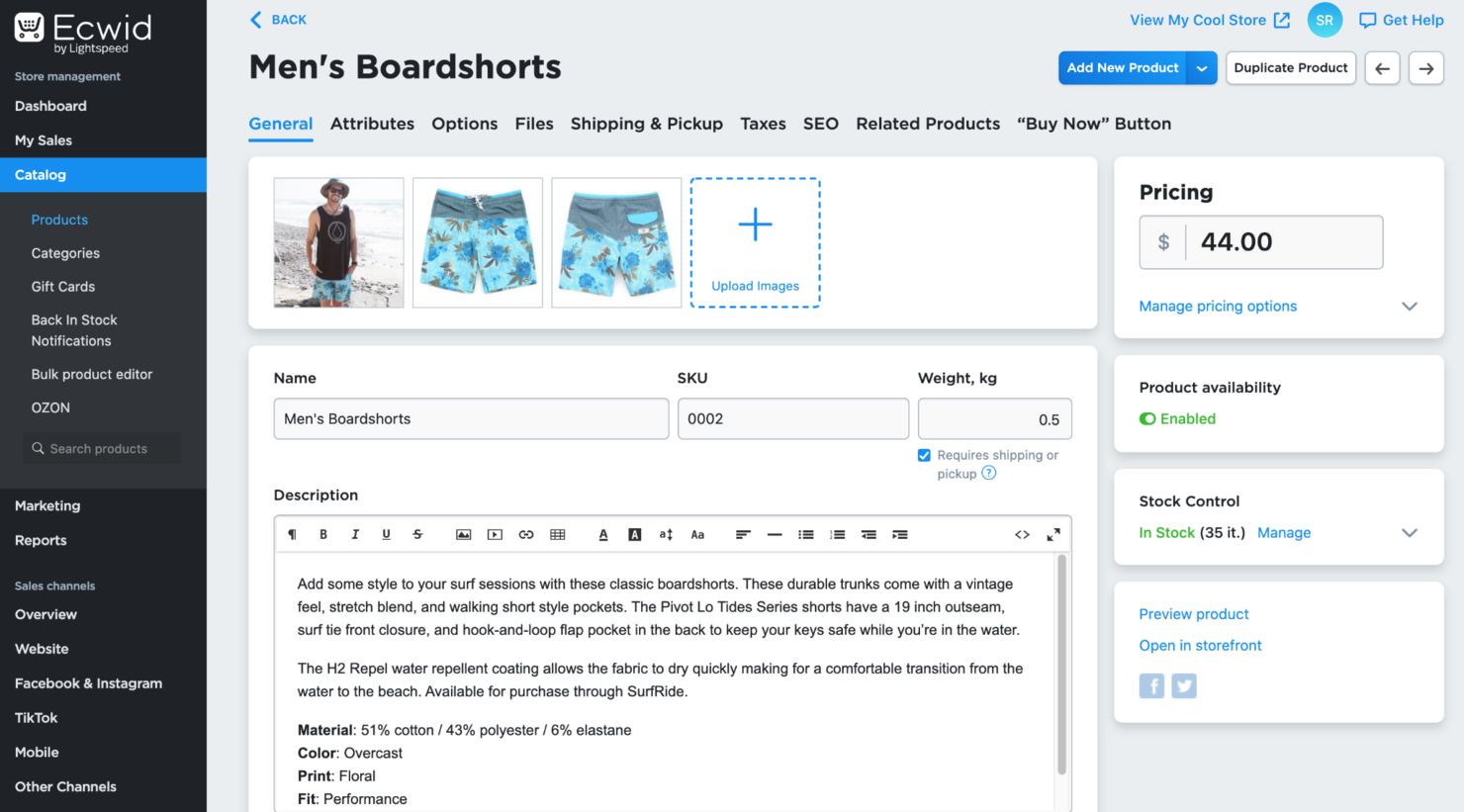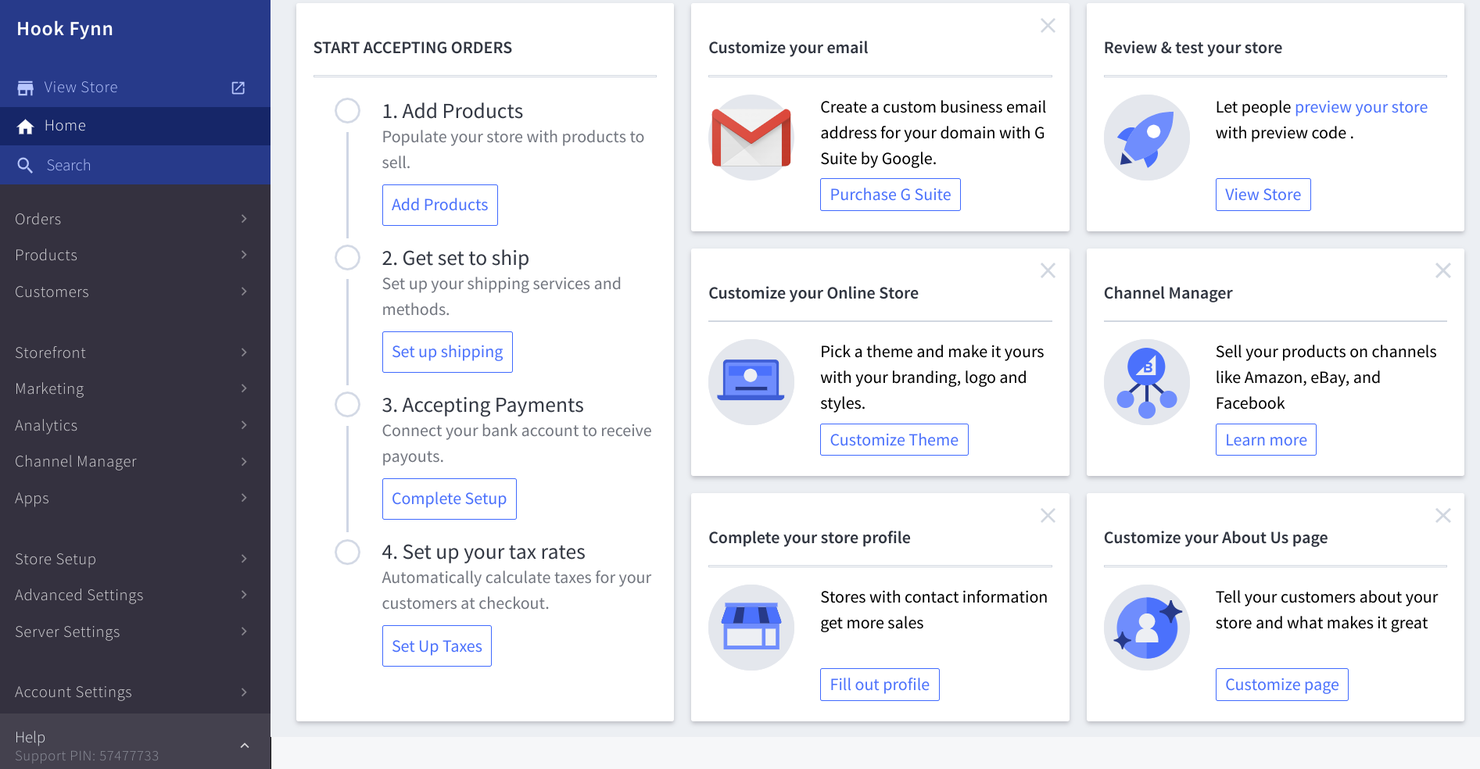10 Shopify Alternatives Shortlist
Here's my pick of the 10 best software from the 15 tools reviewed.
With so many different Shopify alternatives and competitors available, figuring out which is right for you is tough. You know you want a different solution for creating and managing online stores—but now need to figure out which tool is best. I've got you! In this post, I'll help make your choice easy, sharing my personal experiences managing online commerce businesses, with my picks of the best Shopify alternatives and competitors overall.
Why Trust Our Reviews
We’ve been testing and reviewing ecommerce software since 2018. As ecommerce managers ourselves, we know how critical, and difficult it is to make the right decision when selecting software.
We invest in deep research to help our audience make better software purchasing decisions. We’ve tested more than 2,000 tools for different ecommerce use cases and written over 1,000 comprehensive software reviews. Learn how we stay transparent & our software review methodology.
The Best Shopify Alternatives Comparison Chart
Here is a convenient table where you can compare the tools we just discussed.
| Tools | Price | |
|---|---|---|
| Wix | From $16/month (billed annually) | Website |
| Ecwid by Lightspeed | From $19/month | Website |
| Squarespace | From $16/month (billed annually) | Website |
| PrestaShop | No price details | Website |
| BigCommerce | From $29/month (billed annually) | Website |
| Zoho Commerce | From $22/month (billed annually) | Website |
| Adobe Commerce | Pricing available upon request. | Website |
| Square Online | From $35/month and 2.9% + $0.30/transaction | Website |
| WooCommerce | Free to use. | Website |
| NetSuite SuiteCommerce | $999/month + $99/month/user | Website |

Compare Software Specs Side by Side
Use our comparison chart to review and evaluate software specs side-by-side.
Compare SoftwareHow to Choose a Shopify Alternative
When selecting software for your business, especially when considering a specialized tool such as a Shopify alternative, it's essential to approach the decision with a strategic mindset. Here’s a checklist that balances general software selection principles with specific considerations for Shopify alternatives:
- Compatibility and Integration: Ensure the software integrates seamlessly with your existing tools and platforms.
- Ease of Use: Look for user-friendly interfaces that require minimal training.
- Customization: The software should offer customization options to match your brand and workflow needs.
- Scalability: Choose software that can grow with your business, handling increased transactions and products.
- Security: Prioritize platforms with robust security features to protect your data and customer information.
- Customer Support: Consider the availability and quality of customer support offered by the provider.
- Pricing Structure: Evaluate the cost relative to the features provided and the potential ROI for your business.
- Performance and Reliability: Check for any known issues with website downtime or performance lag.
- User Reviews and Feedback: Research what other businesses have to say about their experiences with the software.
This checklist helps in making an informed choice that aligns with both general business software needs and specific ecommerce considerations.
Shopify Alternatives: Reviews
Here are the best Shopify alternatives on the market and what each does best.
Wix is a versatile website builder that also offers an integrated ecommerce platform, allowing businesses to easily create and manage their online stores with a user-friendly interface, customizable templates, and a range of ecommerce features.
Why Wix is a great Shopify alternative
Wix is a super intuitive and user-friendly website builder, making it easier for beginners or those without technical expertise to create and customize their online stores. Wix also offers more diverse features beyond typical ecommerce, such as blogging, event management, and membership sites, allowing businesses to have a more versatile online presence. The Wix Events & Tickets module is free to add to your site and allows you to host and showcase your events online, sell tickets and collect RSVPs, check in guests with the Wix mobile app, and empower guests to connect and network. Wix allows you to have a free plan with a wixsite.com domain, Wix ads on every page, and bandwidth lmitations.
Wix eCommerce Standout Features and Integrations
Features that make Wix eCommerce worth checking out include their AI-generating website tool and access to 500+ designer-made templates (some with additional costs) to get a store put together and running fast, even if you are a beginner in this space. Custom functionality with APIs means you can plug in virtually any other software (think: abandoned cart recovery, advanced omnichannel marketing, and sales lead management) so long as you have the technical knowledge to do so.
Integrations include 123FormBuilder, AdScale, AfterShip, Cart2Cart, Dropbox, EasyShip, Eventbrite, Google Drive, Importify, JivoChat, Klaviyo, Mailchimp, Meta for Business, Privy, SoundCloud, and others.
Pros and cons
Pros:
- Sell and host online events
- Intuitive and user-friendly interface
- Extensive app marketplace
Cons:
- Convoluted pricing ($27/month for ecomm)
- Free plan has Wix ads
Best Shopify alternative for omnichannel ecommerce
Ecwid is an all-in-one ecommerce solution that enables you to promote and sell your products on your customers’ favorite platforms, whether that’s Instagram, TikTok, Pinterest, a website, Amazon, or eBay.
Why Ecwid is a great Shopify alternative
Ecwid offers seamless integration with existing websites and social media platforms, allowing businesses to effortlessly add an online store without the need for a separate website. This flexibility enables a more personalized and cohesive customer experience. Ecwid supports multichannel selling, allowing merchants to sell across various online platforms simultaneously. Ecwid also provides a range of pricing plans, including a free option, making it more accessible for small businesses or those with limited budgets. Lastly, Ecwid offers extensive language and currency support, including 53 language options and 130 currencies—Shopify has 21 languages, 13 currencies.
Ecwid Standout Features and Integrations
Features that make them worthy of a place on this list include omnichannel selling across every platform you can imagine (Facebook, Google, Amazon, ShopApp) and 50+ marketing app integrations like Google Tag Manager, Intercom, and HelpfulCrowd. One thing to be mindful of is that many of their integrations cost extra. However, you may save those costs in shipping fees, as Ecwid offers group Discount Shipping Labels for USPS.
Integrations are extensive and include Intercom, Pinterest, Printful, SUP Dropshipping, Google Shopping, Affiliately, EasyAds, Outfy, Popconverts, and TaxJar. Many others are available by connecting a paid Zapier account.
Pros and cons
Pros:
- Free plan for up to 10 products
- Supports 130 currencies
- Multichannel selling support
Cons:
- Limited analytics tools
- Lean SEO and marketing features
Squarespace is an all-in-one website building and ecommerce platform that offers beautifully designed templates, intuitive customization options, and essential ecommerce features for businesses to create and manage their online stores.
Why Squarespace is a great Shopify alternative
Squarespace offers a simpler and more intuitive interface, making it easier for beginners to set up and manage their online stores without extensive technical knowledge. In line with this, Squarespace offers a more visually focused approach with its easily accessible stunning and modern templates, making it an ideal choice for businesses that prioritize aesthetics and design. Squarespace also offers a larger variety of free templates (not including any obtained through external intergrations or plugins—Squarespace has over 90, Shopify has 17.
Squarespace Standout Features and Integrations
Features include customizable website templates, flexible galleries, blogging tools, SEO tools, in-depth analytics, logo maker, and mobile editing.
Integrations include Mailchimp, Klaviyo, Zendesk Suite, Salesforce, Trello, Xero, ActiveCampaign, Basecamp, Constant Contact, Google Analytics 360, AWeber, ShipStation, Stripe, and Zapier.
Pros and cons
Pros:
- Aesthetic, no-code site templates
- User-friendly to learn and use
- Reliable and responsive customer support
Cons:
- Fewer integrations than others
- No full access to site code
PrestaShop is a feature-rich and user-friendly open source ecommerce platform that enables businesses to create and manage their online stores with flexibility and customization options.
Why PrestaShop is a great Shopify alternative
As an open source platform, PrestaShop offers more freedom and flexibility in terms of customization, allowing businesses to tailor their online stores to their specific needs and preferences. PrestaShop is a free-to-download ecommerce platform, but it requires self-installation, finding and paying for web hosting services, as well as performing regular maintenance and updates to ensure its smooth operation. With PrestaShop, you'll have greater flexibility and cheaper costs but at the price of needing to handle site building and maintenance on your own, no hand-holding. PrestaShop is a great option for advanced users with experience in website design and coding.
PrestaShop Standout Features and Integrations
Features include a comprehensive multi-store management system, allowing businesses to operate and manage multiple online stores from a single backend interface. This feature is particularly advantageous for enterprises with diverse product lines or international operations. PrestaShop also has a robust and active community of developers and users who contribute to its extensive marketplace of modules and themes.
Integrations include HubSpot, QuickBooks, Salesforce, Zoho CRM, Xero, and many more. Additional integrations are also available by connecting a paid Zapier account.
Pros and cons
Pros:
- Open source platform
- Free to download
- Wide range of modules and themes
Cons:
- Technical expertise required
- Lean official documentation
Best Shopify alternative for a built-in inventory management system
BigCommerce is a robust and scalable ecommerce platform that empowers businesses to create and manage their online stores with advanced features and flexibility.
Why BigCommerce is a great Shopify alternative
BigCommerce offers tons of advanced built-in features and functionalities, including comprehensive inventory management, advanced shipping options, and flexible pricing rules, making it suitable for businesses with complex needs. BigCommerce also provides excellent scalability and performance, with higher thresholds for product listings, bandwidth, and sales volume, making it a preferred choice for businesses with rapid growth or larger catalogs. BigCommerce has a transparent pricing structure with no transaction fees, making it a cost-effective option for businesses looking for a reliable monthly price.
BigCommerce Standout Features & Integrations
Features include native integrations with popular marketplaces like Amazon, eBay, and Google Shopping, allowing businesses to expand their reach and sell on multiple channels effortlessly. Plus, BigCommerce provides advanced built-in SEO features, including customizable URLs, meta tags, and canonical tags, empowering businesses to optimize their online stores for search engines and improve organic visibility.
Integrations include Amazon, BigCommerce, Easyship, eBay, Etsy, Lightspeed, Marketo, Microsoft Dynamics, NetSuite, QuickBooks, Salesforce, ShipWorks, Shopify, Square, and WooCommerce, among others.
Pros and cons
Pros:
- Robust inventory management tools
- Integrated payment processing, 25+ currencies
- Flexible product pricing rules
Cons:
- Steep learning curve
- Muddy API documentation
Zoho Commerce is a comprehensive ecommerce platform that combines website building, inventory management, marketing tools, and CRM capabilities, enabling businesses to create and grow their online stores efficiently.
Why Zoho Commerce is a great Shopify alternative
Zoho Commerce offers seamless integration with the broader suite of Zoho applications, allowing businesses to streamline their operations by integrating ecommerce with CRM, inventory management, and marketing tools in a single ecosystem. This integration enhances efficiency and data synchronization across various aspects of the business. Zoho Commerce provides more affordable pricing plans, making it an attractive option for small businesses or those with budget constraints. SMBs will also appreciate that Zoho Commerce provides robust customer support and documentation, ensuring that users can easily access assistance and resources when needed.
Zoho Commerce Standout Features & Integrations
Features include seamless integration with Zoho's suite of business applications, such as Zoho CRM, Zoho Books, and Zoho Inventory, enabling businesses to streamline their operations and have a unified view of customer data, finances, and inventory management. This integration fosters efficient collaboration and data synchronization across different departments and makes Zoho software hugely scalable and flexible.
Integrations include Microsoft Office 365, Microsoft Teams, Google Drive, Zendesk, and ServiceNow. Integrations via Zapier and Zoho Flow are also supported. Being part of the Zoho ecosystem allows you to connect to several of Zoho’s own services for Sales, Marketing, CRM, customer service, and more options.
Pros and cons
Pros:
- Integrates with other Zoho applications
- Competitive pricing plans
- Supports multi-channel selling
Cons:
- Smaller ecosystem of third-party integrations
- Limited site template options
Adobe Commerce is a comprehensive and scalable ecommerce platform that combines the power of Magento with Adobe's suite of digital experience tools to provide a robust solution for businesses looking to create personalized and engaging B2B and B2C online shopping experiences.
Why Adobe Commerce is a great Shopify alternative
Adobe Commerce offers a highly customizable and flexible platform, allowing businesses to create unique and personalized online shopping experiences tailored to their specific needs. With its extensive range of features and integrations, Adobe Commerce is well-suited for businesses with complex product catalogs, advanced customization requirements, and a need for robust backend functionality. Additionally, Adobe Commerce provides a seamless integration with Adobe's suite of digital experience tools, enabling businesses to create cohesive and engaging omnichannel experiences across various touchpoints.
Adobe Commerce Standout Features & Integrations
Features worth checking out include is its capability to handle multi-brand companies with diverse product catalogs, even when catering to vastly different audiences such as B2B and B2C. This flexibility allows businesses to efficiently manage and showcase their offerings to various target markets. Another standout feature is the built-in PWA Studio, which empowers users to create and launch progressive web apps for their online stores. With PWA Studio, businesses are guided through the process of building selling apps that prioritize performance optimization and responsive design.
Integrations include over 3,700 paid and free options, like EasyShip, eDesk, Facebook Business, Google Shopping, LiveHelp, Stripe, Mailchimp, Quickbooks, SendCloud, and Stripe.
Pros and cons
Pros:
- Can handle extensive catalogs
- Extensive customization options
- Integration with Adobe's DXP tools
Cons:
- Higher cost than many
- Steep learning curve
Square Online is a user-friendly and all-in-one ecommerce platform that enables businesses to easily create and manage their online stores, accept payments, and synchronize inventory with any brick-and-mortar operations.
Why Square Online is a great Shopify alternative
Everyone has an online store these days, including traditional brick-and-mortar operations. Square Online is a unique ecommerce solution in that you can merge the operations of your physical store with a digital commerce storefront. Using Square Online, you can set up and ecommerce website while their backend system controls inventory and point-of-sale across both physical and digital storefront. Additionally, Square Online offers seamless integration with the broader suite of Square tools, including payment processing, inventory management, and point-of-sale systems, providing a cohesive and efficient solution for businesses.
Square Online Standout Features and Integrations
Features worth noting include a suite of marketing and analytics tools, such as email marketing campaigns and sales reports, that can help businesses drive traffic and sales to their online store. Square Online also offers a range of shipping and fulfillment options, including integrations with popular carriers like USPS and FedEx. This allows businesses to easily manage their shipping processes and provide real-time shipping rates to their customers.
Integrations include Acuity Scheduling, Craftable, Deliverect, Endear, GoDaddy, LinkTree, MailChimp, Prizeout, Thrive Inventory, Wix, WooCommerce, and others.
Pros and cons
Pros:
- Integrates with other Square tools
- Omnichannel sales capabilities
- Responsive customer suppor
Cons:
- Limited design customization
- Transaction fees per sale
WooCommerce is a popular and powerful ecommerce plugin for WordPress that enables businesses to transform their websites into fully functional online stores.
Why WooCommerce is a great Shopify alternative
WooCommerce offers unparalleled flexibility and customization options since it is built on WordPress, allowing businesses to have complete control over their online store's design, functionality, and hosting. WooCommerce is open source, which means users have access to a vast community of developers and a wide range of plugins and themes to extend the platform's capabilities. This makes it suitable for businesses with unique requirements or those seeking more advanced customization. If you are already working from a WordPress site, WooCommerce is a no briainer to transform your site into an online store. WooCommerce is free to install but may incur transaction fees, feature expansion costs, and plugin/add-on costs.
WooCommerce Standout Features and Integrations
Features that make WooCommerce worthy of consideration include event-based marketing, like automatic abandoned cart recovery notifications and customized communications around birthdays, holidays, or membership anniversaries. They also have rewards and incentive programs that you can choose from to build VIP lists or affiliate opportunities. WooCommerce also boasts a large and active community of developers and users, which means there are a lot of resources, plugins, and themes available to enhance the platform's functionality and design.
Integrations include Affirm Payments, Amazon Pay, Facebook, GoCardless, Google Analytics, PayPal, ShipStation, Stamps.com, Stripe, and other tools you already use.
Pros and cons
Pros:
- Vast extension, plug-in library
- Integrates with existing WordPress
- Open source and extensibility
Cons:
- Requires WordPress site
- Ecomm costs extra ($25/month)
NetSuite SuiteCommerce is a unified commerce platform that seamlessly integrates ecommerce, inventory management, CRM, and order management, providing businesses with a comprehensive solution for managing their online sales and operations.
Why NetSuite SuiteCommerce is a great Shopify alternative
SuiteCommerce is a fully integrated solution that combines ecommerce functionality with robust inventory management, CRM, and order management capabilities, providing businesses with a unified platform to streamline their operations and data flow. SuiteCommerce offers advanced customization options, allowing businesses to create unique and tailored online experiences for their customers. The platform is highly scalable and suitable for businesses with complex requirements or those seeking enterprise-level capabilities. NetSuite SuiteCommerce provides comprehensive analytics and reporting tools, empowering businesses to gain deep insights into their online performance and make data-driven decisions.
NetSuite SuiteCommerce Standout Features & Integrations
Features worth highlighting include its seamless integration with NetSuite's robust ERP system, providing businesses with a unified platform for managing both ecommerce and back-office operations. This integration enables real-time data synchronization, streamlined order management, inventory control, and financial reporting. Additionally, SuiteCommerce offers extensive customization capabilities, allowing businesses to create personalized shopping experiences, implement advanced pricing and promotions, and design responsive, mobile-friendly storefronts.
Integrations include LiveChat, ShipStation, Georgias, Mailchimp, Quickbooks Online, Yotpo Product Reviews, Justuno, Brightpearl, Acumatica, ActiveCampaign, Hubspot, Klavyio, Shopgate, Printify, and dozens of other apps.
Pros and cons
Pros:
- Robust reporting and analytics
- Advanced customization options
- Fully integrated solution (inventory, CRM, orders)
Cons:
- Higher cost than others
- Steep learning curve
Other Shopify Alternatives
Here are a few more options to consider:
- Weebly
Best alternative for simplified order management
- Volusion
Best alternative for its scalable features
- Sellfy
Best alternative for creators to sell merchandise or digital products
- Shift4Shop
Best for its free end-to-end ecommerce plan
- Big Cartel
Best alternative for artists and makers
Related Ecommerce Software Reviews
If you still haven't found what you're looking for here, check out these related ecommerce tools that we've tested and evaluated.
- Ecommerce Platforms
- Inventory Management Software
- Payment Processing Software
- Shopping Cart Solutions
- Order Management Systems
- Warehouse Management Software
Selection Criteria for Shopify Alternatives
Selecting the right Shopify alternatives involves a careful evaluation of what they have to offer. Through extensive personal trials and research, I've developed criteria to guide software buyers towards making an informed decision.
Core Functionality - 25% of total weighting score:
- Product inventory management
- Seamless payment processing options
- Customizable storefront designs
- Integrated shipping and logistics solutions
- Analytics and reporting tools
Additional Standout Features - 25% of total weighting score:
- Unique marketing tools or integrations that offer a competitive edge, like advanced SEO features or AI-driven product recommendations.
- Innovative customer engagement features, such as loyalty programs or chatbots, that enhance the shopping experience.
- Platforms offering advanced analytics and AI insights to predict trends and optimize inventory.
Usability - 10% of total weighting score:
- Intuitive design that balances powerful functionality with user-friendly interfaces.
- Visual customization tools that don’t require deep technical knowledge.
Onboarding - 10% of total weighting score:
- Availability of comprehensive guides, tutorials, and customer support from day one.
- Features like interactive product tours and setup wizards that simplify initial setup.
Customer Support - 10% of total weighting score:
- Responsive support teams accessible through multiple channels.
- Community forums or resources where users can exchange tips and solutions.
Value For Money - 10% of total weighting score:
- Transparent pricing models that offer clear benefits at different tiers.
- Consideration of long-term value through scalability and feature inclusiveness.
Customer Reviews - 10% of total weighting score:
- Consistently positive feedback across various dimensions such as ease of use, customer service, and feature set.
- High satisfaction rates indicating a strong alignment with user expectations.
This approach ensures a holistic view of each Shopify alternative, focusing not just on the basics but also on how well each platform can adapt to the evolving needs of ecommerce businesses.
5 Reasons Why You Might Need A Shopify Alternative
You require an easier-to-use payout system
Shopify payments is designed to help new businesses. But if you want to move your existing business to Shopify, the platform may require additional documentation to support your payout after your shop’s conversion.
This generally comes as a surprise to business owners because it’s not included in the conversion process and Shopify only brings it up the moment you want to execute the payout.
So even though Shopify’s payment processor is not bad, some business owners may want to look for more user-friendly ones.
You want a more customizable online store website
Shopify websites look great, but you can tell that a shop’s on Shopify at a glance. The platform allows you to customize your online store, but the web design customization options are limited.
Shopify websites look alike, so you can’t use your website’s appearance as a competitive advantage over other online stores operating in your niche.
You want more a responsive customer service team
Did I mention that there are over 3.7 million websites on Shopify? As you can imagine, their customer support team is pretty busy.
Now, their support specialists are great and answer all your questions in detail, but you might wait for that answer for some time.
You want a URL structure better for SEO
URL structure is important in SEO and is the subject of some heated arguments. Despite the arguments, most experts agree that using subdirectories can hurt your SEO score, especially if your links become too long.
Shopify uses subdirectories like “/pages/” or “/blog/news/” when it creates links, which is not ideal for SEO purposes.
You need better multilingual support
The Shopify app is not great for international sellers. The platform has been slowly improving in this area by making it easier to use different languages in the store and enabling visitors to switch between different languages. There are several third-party apps you can use to translate your product information.
However, Shopify admin is available in only 19 languages, and connecting with a support specialist who speaks something other than English can be challenging. If you use a third party app for translations, getting support can be even more difficult.
What Is Shopify?
Shopify is an ecommerce platform that allows individuals and businesses to create and manage their own online stores. It provides tools for product listing, sales processing, inventory management, and payment processing, all within a user-friendly interface.
Shopify supports a wide range of businesses, from small startups to large enterprises, offering customizable templates, marketing tools, and integration with various apps. Its purpose is to simplify the process of setting up and running an online store, making e-commerce accessible to a broad audience.
Key Features For A Viable Shopify Alternative
Here are the key features I look for in a viable Shopify alternative.
Flexible online shop builder
The perfect online store builder would give you unlimited customization options, allowing you to change every single detail about your store. Although hyper-customization might not be great for beginners, I believe that flexibility is needed by anyone after the initial learning curve of using a new tool.
Every website builder I included on my list gives you multiple customization options.
Shipping and fulfillment options or plugin
Customers prefer fast and free shipping options, with 75% admitting that free shipping options have a significant influence on their purchasing decision.
The solutions I included on my list offer multiple shipping and fulfillment options and/or are compatible with plugins that help.
Inventory and catalog management
Managing your inventory and updating it in real time is crucial to running a successful online store. Shopify is great at inventory management, so I looked for providers that make this process run just as smoothly.
Marketing tools and/or integrations
This goes without saying, but you can’t run a successful eCommerce website without marketing and advertising. For example, email marketing. A tool like this one can help you address a customer who left a shopping cart with items and invite them to checkout.
The solution should either offer a powerful marketing suite or integrate with popular marketing tools so you can grow your business. Sometimes, these integrations will need your team to use the available API to connect your tools.
Frequently Asked Questions
Here are a few questions and answers relating to the topic of Shopify alternatives.
Who is Shopify biggest competitor?
Shopify’s biggest competitor in the ecommerce platform space is WooCommerce, a plugin for WordPress that allows users to create and manage online stores. For comparison, 1.75 million sellers use Shopify; 6.5 million websites choose WooCommerce. Shopify has name recognition thanks to powerful ad campaigns but it is not the most used ecommerce platform on the market by far. Part of the appeal is that WordPress is free to use. Then, as your site grows, you can simply convert it into a store with the WooCommerce plugin. Meanwhile, Shopify offers a free trial and a discounted 3 months but is not free to use.
What is a free alternative to Shopify?
As mentioned throughout this article, there are plenty of free alternatives to Shopify. Here are a few of the more popular ones:
- PrestaShop – Completely free to download and use
- OpenCart – Completely free and open-source
- Adobe Commerce Open-Source – A free community edition of Adobe Commerce
- WooCommerce – Completely free and open-source
You can read more about these free ecommerce platforms and more on my review article: Free Ecommerce Platforms.
Which Shopify alternative is easiest to use?
Wix is widely regarded as easy to use due to its intuitive and user-friendly interface. It offers a drag-and-drop website builder that allows users to visually design their online store without any coding knowledge. The platform provides a vast library of professionally designed templates, which can be easily customized to match individual preferences. Wix also offers a simple setup process, guiding users through each step, and providing helpful prompts along the way. Additionally, Wix provides a wide range of built-in features and apps, such as payment gateways, inventory management, and marketing tools, all conveniently accessible within the platform’s user interface. These aspects collectively make Wix a popular choice for individuals and small businesses looking for an easy-to-use e-commerce platform.
Can I easily migrate my existing Shopify store data to another platform?
Yes, migrating your Shopify store data to another platform can be straightforward, but it largely depends on the destination platform you choose. Many Shopify alternatives offer dedicated migration tools or services designed to simplify the process. These tools can help transfer products, customer data, and order histories. However, it’s important to review the specific migration support offered by your new platform, as some data elements may require manual intervention or customization to ensure a seamless transition.
Why might I need to replatform my ecommerce store?
Businesses often consider replatforming their ecommerce store to address growing needs that their current platform can’t meet, such as scalability issues, high transaction fees, or lack of certain features. Other reasons include the desire for better customization options, improved customer service from the platform provider, or more robust integration capabilities with other tools and systems. Replatforming offers the opportunity to enhance your store’s functionality, improve customer experience, and potentially reduce operational costs.
What are some common complaints about Shopify?
Common complaints about Shopify revolve around its transaction fees, which can add up, especially for stores with high sales volumes. Another point of contention is the customization limitations within Shopify’s templating language, Liquid, which might require hiring a developer for more complex customizations. Additionally, some users find the built-in features insufficient for their specific business needs, leading them to rely on third-party apps, which can increase monthly costs.
Other Ecommerce Platform Reviews
Shopify is a popular ecommerce platform but it's not the only ecommerce platform. If you have a specific idea of what kind of ecommerce paltform you're looking for (cheap, easy ot use, enterprise-grade) then you might want to check out these other similar reviews.
- Enterprise Ecommerce Platforms
- Headless Ecommerce Platforms
- Easiest Ecommerce Platforms
- Omnichannel Commerce Platforms
- Open Source Ecommerce Platforms
- B2B Ecommerce Platforms
- Ecommerce Marketplace Platforms
- Social Commerce Platforms
- Cheap Ecommerce Platforms
Conclusion
Shopify is a strong online store builder, but as we’ve seen in this review, its competitors can hold their own. The truth is that it’s impossible to name a single solution as the best ecommerce platform because every online business has its own needs.
If you want to stay on top of what’s happening in the eCommerce space and receive updates directly in your inbox, subscribe to The Ecomm Manager Newsletter.




















